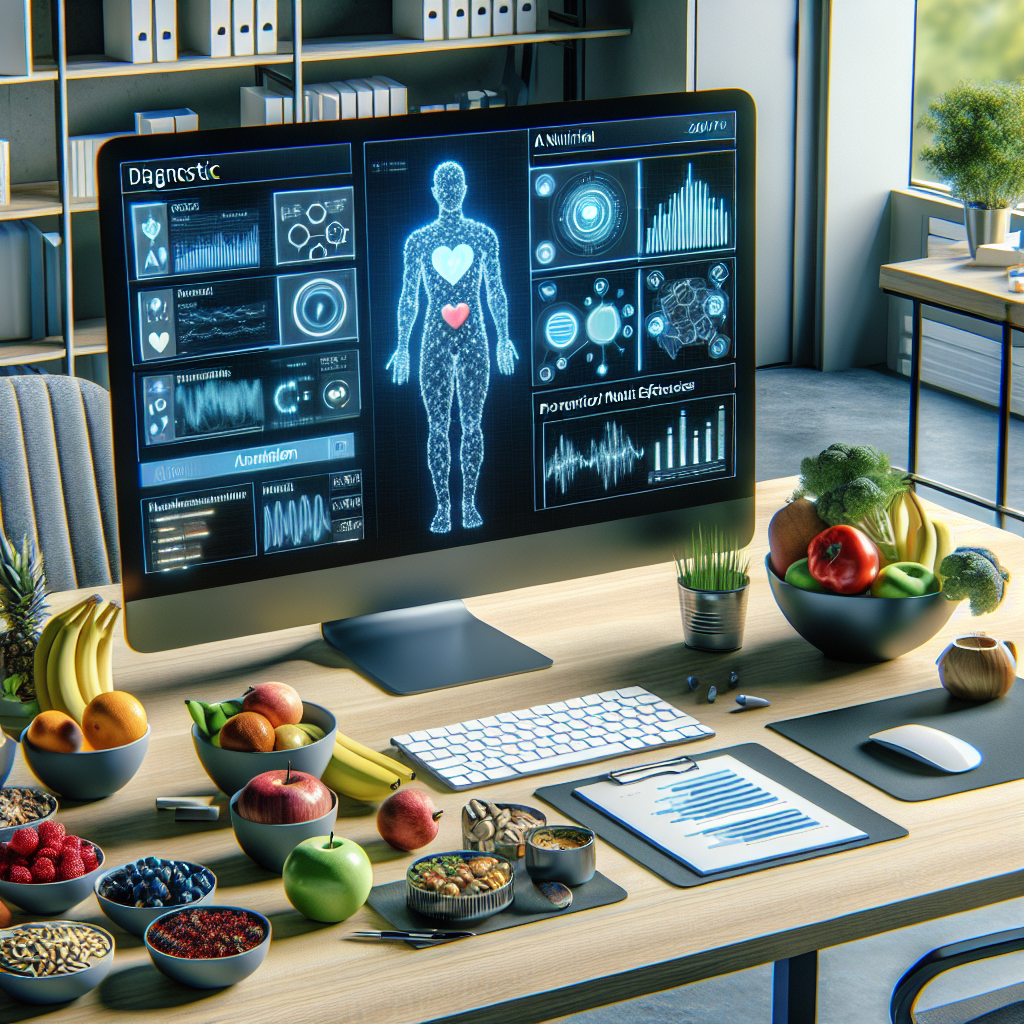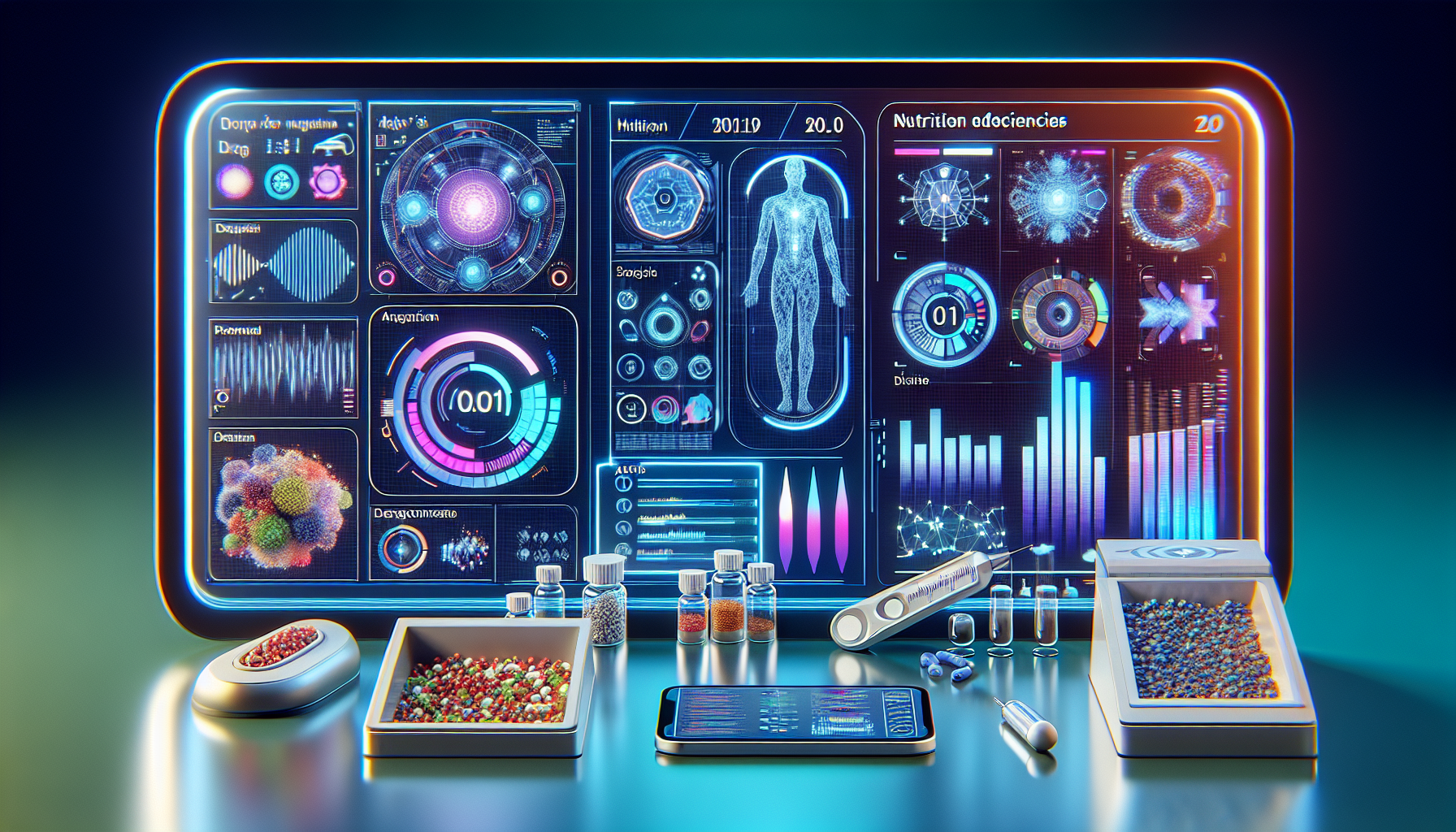AI-Driven Diagnostic Tools to Prevent Nutrient Deficiencies

Exploring the Impact of AI-Driven Diagnostic Tools on Early Detection of Vitamin Deficiencies
In the realm of healthcare, the advent of artificial intelligence (AI) has heralded a new era of precision and efficiency, particularly in the domain of diagnostics. Among the myriad applications of AI, its role in the early detection of vitamin deficiencies stands out as a beacon of hope for preventing the myriad health issues that arise from such deficiencies. This exploration into the impact of AI-driven diagnostic tools on the early detection of vitamin deficiencies reveals a promising horizon for both healthcare professionals and patients alike.
The journey into understanding this impact begins with recognizing the critical role vitamins play in our overall health. Vitamins are essential for the proper functioning of our bodies, supporting everything from immune response to bone health. However, detecting their deficiencies has traditionally relied on a combination of symptom observation and laboratory tests, which can sometimes result in delayed diagnosis and treatment. This is where AI steps in, transforming the landscape of diagnostics with its ability to analyze vast amounts of data with precision and speed.
AI-driven diagnostic tools leverage machine learning algorithms to identify patterns and anomalies in patient data that might indicate a vitamin deficiency. These tools can analyze data from a variety of sources, including blood tests, dietary habits, and even genetic information, to provide a comprehensive assessment of a patient’s nutritional status. This holistic approach not only enhances the accuracy of diagnoses but also enables the early detection of deficiencies, often before symptoms become apparent.
The significance of early detection cannot be overstated. By identifying vitamin deficiencies at their nascent stages, AI-driven tools pave the way for timely intervention, preventing the progression of deficiencies into more severe health issues. For instance, early detection of Vitamin D deficiency can lead to immediate supplementation, averting the risk of bone disorders like osteoporosis. Similarly, identifying a lack of Vitamin B12 early on can prevent potential neurological damage. Thus, these AI tools are instrumental in mitigating the long-term health impacts associated with vitamin deficiencies.
Moreover, the predictive capabilities of AI extend beyond individual diagnoses. By aggregating and analyzing population-level data, AI-driven diagnostic tools can identify trends and risk factors associated with vitamin deficiencies in different demographics. This information is invaluable for public health initiatives aimed at addressing nutritional gaps in specific communities or populations. For example, if an AI tool identifies a high prevalence of Vitamin A deficiency in a particular region, targeted nutritional programs can be implemented to combat this issue.
The integration of AI into the diagnostic process also holds promise for personalized nutrition. By considering an individual’s unique genetic makeup, lifestyle, and health history, AI can recommend tailored dietary plans to prevent potential deficiencies. This personalized approach not only enhances the effectiveness of nutritional interventions but also empowers individuals to take proactive steps towards maintaining their health.
In conclusion, the impact of AI-driven diagnostic tools on the early detection of vitamin deficiencies is profound and multifaceted. By enhancing the accuracy, speed, and comprehensiveness of diagnostics, these tools are revolutionizing the way healthcare professionals approach the prevention and treatment of nutrient deficiencies. As AI technology continues to evolve, its potential to safeguard against the myriad health issues associated with vitamin deficiencies grows ever more promising. In this light, the future of nutritional health appears not only brighter but also smarter, thanks to the transformative power of artificial intelligence.
The Role of Artificial Intelligence in Personalizing Nutrient Deficiency Treatments

In the realm of healthcare, the advent of artificial intelligence (AI) has heralded a new era of precision and personalization, particularly in the diagnosis and treatment of nutrient deficiencies. These deficiencies, often subtle yet impactful, can lead to a myriad of health issues if left unchecked. However, the integration of AI-driven diagnostic tools is revolutionizing how these deficiencies are identified and addressed, offering a beacon of hope for tailored nutrient management.
Traditionally, diagnosing nutrient deficiencies has been a complex process, reliant on a combination of physical symptom assessment, dietary analysis, and blood tests. This approach, while effective to a degree, often misses the nuanced interplay of various factors contributing to an individual’s nutritional status. Enter AI, with its ability to sift through vast datasets, identifying patterns and correlations that escape human notice. By leveraging machine learning algorithms, AI-driven tools can analyze a person’s dietary intake, lifestyle, genetic predispositions, and biochemical markers with remarkable precision, offering a comprehensive picture of their nutritional needs.
Moreover, AI’s predictive capabilities are a game-changer in preempting nutrient deficiencies. These tools can forecast potential nutritional shortfalls based on current dietary trends and lifestyle choices, enabling proactive interventions. This is particularly beneficial for populations at risk of specific deficiencies, such as vegans who might be prone to Vitamin B12 deficiency or athletes who may require more magnesium. Through timely predictions, AI empowers individuals to make informed dietary adjustments before deficiencies manifest into health problems.
The personalization aspect of AI-driven diagnostic tools is perhaps their most transformative feature. Nutrition is profoundly personal, influenced by an individual’s metabolism, activity level, and even microbiome composition. AI algorithms can digest this complex web of factors to tailor nutrient recommendations that are unique to each person. This bespoke approach ensures that dietary advice is not only more effective but also more achievable, as recommendations align with individual preferences and lifestyles.
Furthermore, AI-driven tools facilitate dynamic adjustments to nutrient management plans. As individuals’ lifestyles and health statuses evolve, so too can their nutritional needs. AI systems continuously learn from new data, allowing them to adapt recommendations in real-time. This flexibility ensures that nutrient management plans remain relevant and effective, fostering long-term health and well-being.
The integration of AI into the diagnosis and treatment of nutrient deficiencies also holds promise for healthcare professionals. By providing a detailed analysis of an individual’s nutritional status, AI tools can support dietitians and nutritionists in crafting more precise dietary interventions. This not only enhances the efficacy of treatments but also improves patient adherence, as personalized plans are more appealing and manageable.
In conclusion, AI-driven diagnostic tools are at the forefront of a nutritional revolution, transforming the way nutrient deficiencies are prevented and treated. By harnessing the power of AI for personalized, predictive, and dynamic nutrient management, these tools offer a path to optimal health that is tailored to the unique needs of each individual. As technology continues to evolve, the potential for AI in personalizing nutrient deficiency treatments is boundless, promising a future where nutritional well-being is accessible to all.
Advancements in AI-Driven Blood Analysis for Comprehensive Nutrient Deficiency Diagnostics
In the realm of healthcare, the integration of Artificial Intelligence (AI) has been a game-changer, particularly in the field of diagnostics. Among the most promising applications of AI is in the development of diagnostic tools aimed at preventing nutrient deficiencies, a global health concern that affects millions of people worldwide. These AI-driven diagnostic tools are revolutionizing the way healthcare professionals approach the detection and treatment of nutrient deficiencies, offering a more precise, efficient, and comprehensive analysis than ever before.
Traditionally, diagnosing nutrient deficiencies has been a complex process, often requiring multiple tests and a considerable amount of time to interpret the results. This complexity can lead to delays in diagnosis, preventing timely intervention and potentially leading to severe health consequences. However, the advent of AI-driven blood analysis is changing this landscape by providing a more streamlined and accurate approach to diagnosing nutrient deficiencies.
AI-driven blood analysis tools leverage machine learning algorithms to analyze blood samples, identifying patterns and markers that indicate nutrient deficiencies. These tools can process vast amounts of data in a fraction of the time it would take human technicians, significantly speeding up the diagnostic process. Moreover, AI algorithms can detect subtle changes in blood chemistry that might be overlooked by traditional methods, leading to earlier detection of nutrient deficiencies.
One of the key advantages of AI-driven diagnostic tools is their ability to provide a comprehensive overview of an individual’s nutritional status. Unlike conventional tests that might focus on a single nutrient, AI-driven tools can assess a wide range of nutrients simultaneously. This holistic approach not only saves time and resources but also provides a more accurate picture of an individual’s health, enabling personalized treatment plans that address all of their nutritional needs.
Furthermore, these AI-driven tools are continually learning and improving. As they analyze more blood samples, the algorithms become better at detecting nutrient deficiencies, even in their earliest stages. This continuous improvement means that AI-driven diagnostics are becoming increasingly reliable and effective over time, offering hope for more proactive and preventive healthcare strategies.
The potential impact of AI-driven diagnostic tools on global health is immense. By enabling early detection and treatment of nutrient deficiencies, these tools can help prevent the myriad health problems that arise from malnutrition, including stunted growth in children, weakened immune systems, and chronic diseases in adults. In regions where access to healthcare is limited, AI-driven diagnostics can be particularly transformative, offering an accessible and affordable solution for nutrient deficiency screening.
In conclusion, the advancements in AI-driven blood analysis for comprehensive nutrient deficiency diagnostics represent a significant leap forward in preventive healthcare. By providing a faster, more accurate, and holistic approach to diagnosing nutrient deficiencies, these tools have the potential to improve the health and well-being of millions of people around the world. As technology continues to evolve, the future of nutrient deficiency diagnostics looks promising, with AI at the forefront of this exciting field.